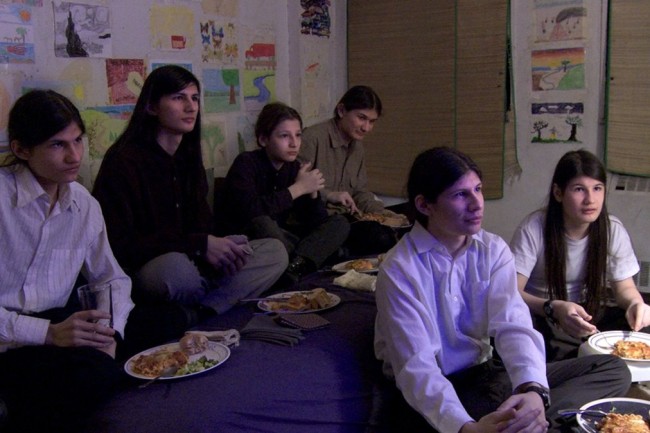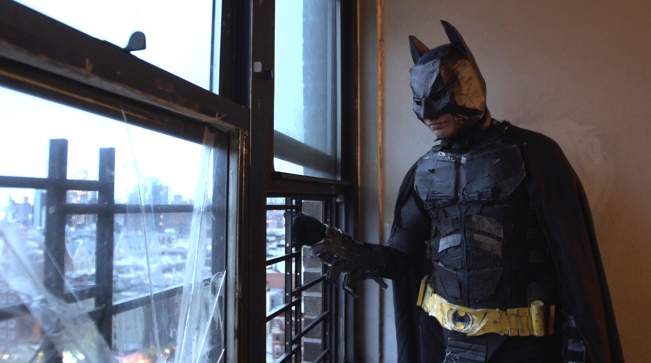By Mikhail Karadimov June 17th, 2015
They say it was fire that brought the wolf in. Warmth. People would gather, in fortified numbers, protected numbers, and gather kindle and set blaze to their evenings. Wolves would feel the heat, the pleasantries, and they would come and watch from the edge of the tree line. They wouldn’t necessarily join the people, not right away, not yet. That would come later. It took time to domesticate wolves into dogs. They had to be coaxed.
So did the Wolfpack. The Angulo Brothers. Half American, half Peruvian. There are six brothers (and one mentally disabled sister). They lead solitary existences. All they know is the Lower East Side apartment where they were raised. Their father, some kind of delusional paranoid, cut them off from New York City upon their birth. Visits to the outside world were rare. One trip a year, maybe two. Maybe none. Same faces every day, same New York vista everyday, as seen through a cracked window. Their view skewed by the jagged and taped-over lines of fissured glass.
To cope, the brothers immersed themselves in movies. They boast a collection of 5000 flicks. Their obsession doesn’t stop with collecting though. They also film their own movies. Line-for-line remakes of their favorites. Quentin Tarantino’s up there. So is The Dark Knight Trilogy. They’re accustomed to the lens, to the cinefreak lifestyle, to people following them around in hopes of hitting visual and symbolic pay dirt.
Cue Crystal Moselle, The Wolfpack’s just-out-of-school director.
It was a brief encounter. A flash. But she quickly recognized the novel peculiarity of five lanky young men with flowing black hair sprinting past her, one by one, in staggered formation, and dashed after them in the hopes of chasing down a story worth shooting. It took her time to convince the brothers to let her into their lives, to ask them questions, to meet their mother and father and lone sister. They had to be convinced that she is indeed a filmmaker. Once the cameras showed up, the lights, the crew, the beautiful young white woman (Moselle)—a type of person that they, at that point, had little to no interaction with—they eased up, they relaxed, just a bit, enough to watch the camera watching them as they babbled, lightly, about their favorite movies, the scripts they’ve transcribed, the costumes they’ve made.
As evidenced by the heaps of Angulo homemade B-Roll, director Moselle leans on throughout the film, the boys are accustomed to the presence of a camera. Growing up, they would capture the most intimate and off-putting moments. Their father drunk, their father kissing them each on the mouths, them wailing away on paper and cardboard instruments, them sleeping. The camera drifted through their lives like a curious transient who couldn’t help but stop and look and linger. The camera became an extra metaphysical member of their family. So did Moselle’s camera, so did the director and her crew. Strangers. Well-adjusted strangers. But with equipment that was oddly familiar, homely, familial even. Moselle and her crew arrived like a group of psychopomps. Their mission might have originally been to shoot a movie—although, lets face it, the results are just about average, not nearly as compelling as the story itself—but as time pressed on, unbeknownst to the crew, their mission changed. Instead of merely documenting these boys, they were there to assist them with their transition into the “real” world.
The Angulo brothers look right into the lens when they speak. That’s not the case with their parents who look over the camera and right at Crystal and whoever else is back there with her. The boys are more direct than that. They’re willing to venture the world as long as the camera’s nearby. They visit Coney Island, they walk along the East River, they venture onto the train. The camera acts as catnip, leading and coaxing the boys out more and more. They feel protected by it. The isolated bubble they had formed in their dingy apartment is recreated for them on the outside with the help of Moselle, her crew, and her camera and its frame of story. Outside, they’re invincible. Nothing can happen to them. They’re in a movie! They’re above harm, above consequences. They’re protagonists now. Untouchables. On track to a world of happy endings. The Angulo boys finally associate senses to moments and actions that were once solely relegated to a 2.39:1 or 1.85:1 or 4:3 plane of existence.
By movie’s end, all the boys are out and about and finding paths that lead off into individually tailored unknowns, unaccompanied by their other brothers, unaccompanied by the camera (for the most part), constantly transitioning, still indebted to film, taking on PA gigs, buying DSLR cameras, buying lenses for those cameras, shooting personal films on the side. The boys break free from their father. But so does their mother. A shell shocked woman. A woman who might never be able to reconcile what had happened to her—whatever that might be—when she allowed her husband to imprison her and her babies. She, too, finally tip toes out into the world. She calls her mother and hears her voice for the first time in fifty years. She goes out for a run. She organizes a trip to an apple orchard with the family. And while at that orchard she peels away from her husband. She points to her boys, all of them finally functioning on their own, finally curious enough to question the world, their father, and tells him: “Lets go join them, I want to see what they’re doing.” The father refuses. So she parts ways as the camera pans with her, eventually nudging the patriarch out of the picture. Mother reunites with her sons and wanders under a canopy of apples. The mother never had anyone to talk to before, to help her feel out, verbally, where she was going, what she was doing. Her husband’s a tyrant with his own rules, his own world, where he presides as a god, and there’s no talking to gods. But she opens up to the camera, she opens up to the mesmerizing red light, RECORD, RECORD, RECORD. She opens up to the camera forgetting that one day thousands of people will witness her account.
Even though I find Moselle’s film and skills questionable, there’s no denying the healing power of the camera when it comes to the Angulo brothers. Moselle stationed her camera, that source of so much entertainment in the Angulo household, and she sat down and waited as the story came to her, as the wolves convened and watched her from the brink, felt the warmth, the welcoming questions, the curious looks, and slunk forth. She put out her hand and waited for the wolves to come.








